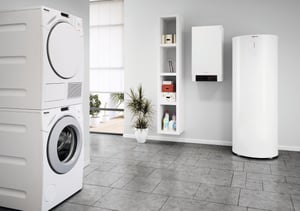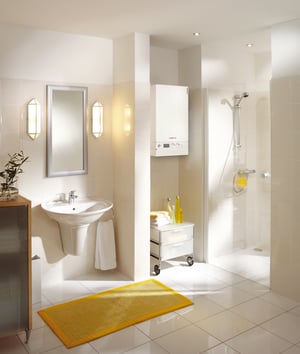With a range of hot water heating options available, what’s your best bet? The simple answer is, there’s no simple answer. The best way to learn what type of hot water heater is best for you and your home comes down to discovering the options available, and what their claims to fame and shortcomings are.

Let's start with a combi system - a combi boiler, short for “combination,” which offers both heat and hot water. A combi boiler contains a flat plate heat exchanger, which heats water on demand. As the heat exchanger cranks up the temperature of water, the boiler provides that water to your shower, sink, or other areas of the house. Because it heats water on demand, there is no storage tank like you might see in your basement now. This lack of hot water storage means that the boiler must run every time hot water is needed. A combi is small - typically wall hanging, and requires a very small amount of space.Want to save the basement for a game room? Install a combi in the closet to open up the floorplan for activities!
On the other side of the spectrum is the more traditional option of a boiler and separate DHW (domestic hot water) storage tank. The water inside the tank is heated by the boiler, where it is stored at a heated temperature until it is used. Unlike the combi system which fires every time you turn the hot water on, a DHW tank will maintain the heat, and will typically only fire the boiler after about half the tank has been used. This can save energy, but also increase the overall lifespan of your boiler, as it doesn’t need to fire each time hot water is needed. In terms of space, this boiler and tank system is closer to what you’re likely used to seeing in a basement or utility room, like the example shown on the right. The boiler takes up some space on the floor (though wall-hung units are also available for non-combi systems), but approximately a 24x24” amount of floorspace is needed for the tank.
A hot water storage system like a DHW tank allows more usable hot water to be available than a combi system. When  hot water is available from the DHW tank, that water can be used, i.e. to fill up a bathtub, in a much shorter time than the 10-12 minutes it would take with a combi boiler system. The reason for this is down to the limits of a combi boiler’s flow rate - it can only heat so much water at a time, regardless of how much water can move through your plumbing fixtures. This also applies to taking multiple showers at once. Because of the DHW tank’s stored hot water, taking two showers at once is possible. because a combi makes the hot water as it is used, the situation may exist where because of the shower fixtures, the combi boiler may only be able to keep up with a single shower.
hot water is available from the DHW tank, that water can be used, i.e. to fill up a bathtub, in a much shorter time than the 10-12 minutes it would take with a combi boiler system. The reason for this is down to the limits of a combi boiler’s flow rate - it can only heat so much water at a time, regardless of how much water can move through your plumbing fixtures. This also applies to taking multiple showers at once. Because of the DHW tank’s stored hot water, taking two showers at once is possible. because a combi makes the hot water as it is used, the situation may exist where because of the shower fixtures, the combi boiler may only be able to keep up with a single shower.
Now, what would happen if you fill your DHW tank with hot water, but the dishes are done, showers are taken, and there’s no need for hot water for hours or more; wouldn’t that waste the energy used to heat the water? Surprisingly, the answer is no! Hot water stored in a quality DHW tank will maintain its temperature thanks to high levels of insulation, meaning that temperature loss is minimal, only about 0.7º per hour with a EVIA 42 gallon tank. In simpler terms - the boiler only has to fire two “recovery cycles” per day to maintain that hot water for immediate use.
A major advantage that you may assume comes along with a combi boiler system is the cost. A smaller, single product, along with simplified installation from your contractor means a much smaller price tag, right? Again, things aren’t always what they seem. Modern boiler systems are designed to work with indirect water heaters (another name for a DHW tank) without much additional equipment or work, and with the inclusion of a tank, only leads to about a 10-15% price increase when compared to a comparably-sized combi boiler.
So what’s the main takeaway? It’s all dependent on your individual needs. If space is the most important factor to you, then a combi boiler may be the winner. But, if efficiency and flow rates of your hot water take precedence, then a boiler/tank combo might be your best bet. Do some research to discover your options, find a trusted contractor (or three!) to get quotes and professional recommendations, and weigh your options to determine what will work best for your whole family for decades to come.
To learn more about domestic hot water options from Viessmann, visit out product page, here.
